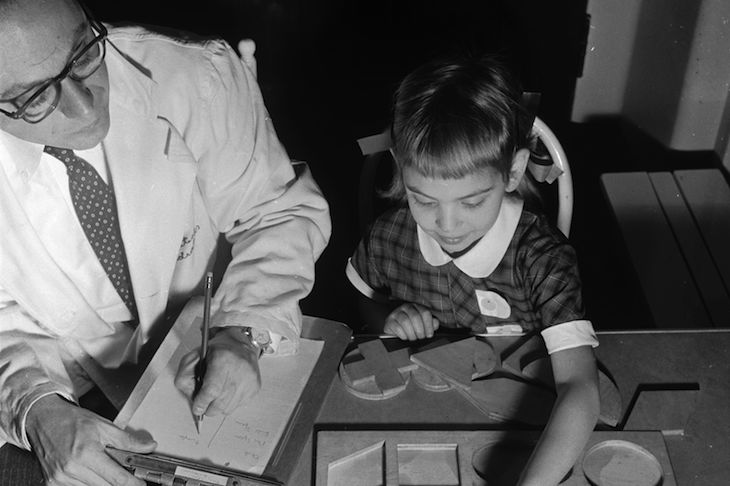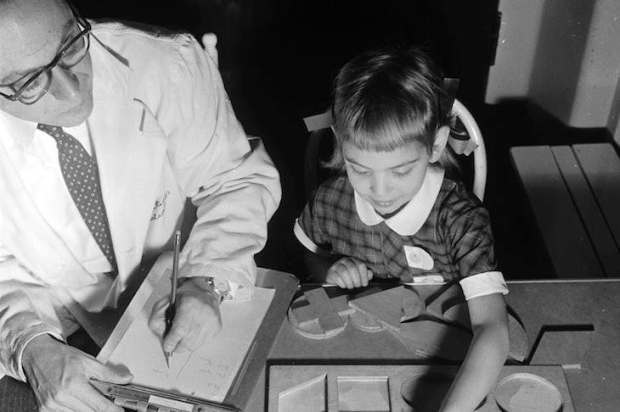I had lunch recently with an assistant head of a leading independent school and he told me about their ‘growth mindset’ work. He was excited about this and he’s by no means exceptional. Eton, Wellington and Stowe have all enthusiastically embraced it, as have thousands of state schools. Highgate Wood, a comprehensive in north London, says on its website that ‘growth mindset is the cornerstone of our learning ethos’.
I hesitate to call growth mindset a ‘fad’ because that implies it lacks the imprimatur of academic respectability when the opposite is true. The term was coined by Carol Dweck, a professor of psychology at Stanford, who made a startling discovery in the course of researching children’s cognitive performance in the 1970s. She noticed that children who believe intelligence is learnt are better at solving problems than those who think it’s innate. ‘In a fixed mindset, students believe their basic abilities, their intelligence, their talents, are just fixed traits,’ she wrote. ‘They have a certain amount and that’s that… In a growth mindset students understand that their talents and abilities can be developed through effort, good teaching and persistence.’ Having stumbled across this finding, Professor Dweck went on to discover something even more remarkable: a growth mindset can be taught. In a series of landmark experiments, she set two groups of children the same tasks. After completing them, both groups were told they’d done extremely well, with one praised for their ability — ‘You must be smart at these problems’ — and the other for their effort — ‘You must have worked hard at these problems’. The two groups were then asked to perform a second set of tasks and in study after study those who’d been praised for their hard work outperformed those told they were smart. Not just that, those children who’d been encouraged to have a growth mindset were more willing to take on another, harder set of problems, more likely to attribute their failure to solve these problems to a lack of effort rather than a lack of intelligence, and more inclined to persevere in the face of these setbacks.
In 99 per cent of psychological tests, researchers report tiny effects, if any, and often struggle to convince their peers of any statistical significance. But in these studies, Dweck discovered huge effects. Not just statistically significant, but among the most gigantic effect sizes in the whole field. Hence the viral momentum behind growth mindset, and not just in education. As Tom Chivers pointed out in a recent piece for BuzzFeed, some of the largest companies in the world, including Google, now test for it in prospective employees. Dweck’s book on the subject has sold more than a million copies and schools can now license software she’s developed called Brainology. Growth mindset is big business.
There are a couple of difficulties, however. For one thing, it seems to require children to believe something that’s demonstrably false. Intelligence is largely innate. Yes, IQ can fluctuate during childhood and, yes, the more effort you put into something the better you’ll do. But to claim that your performance in a cognitive task is entirely dictated by how hard you try and is nothing to do with raw candle-power flies in the face of more than 100 years of intelligence research. It’s not an exaggeration to say we know more about intelligence than any other psychological characteristic and what we know is that it has a genetic basis, people are born with different levels of it and those amounts don’t change much, no matter how hard you concentrate.
Maybe so, say the growth mindset enthusiasts, but if believing this mumbo–jumbo improves children’s performance and makes them better learners, then we’re justified in promoting it. It’s the educational equivalent of a white lie. Actually, ‘snake oil’ might be more accurate. Timothy Bates, a psychology professor at Edinburgh University, has been trying for several years to replicate Dweck’s findings, each time without success, and his colleagues haven’t been able to either. Dweck explains these failures by claiming the psychologists in question don’t create the right experimental environment — it’s too delicate a task for these ham-fisted troglodytes. But if professors of psychology can’t repeat the results, what hope do teachers surrounded by unruly children have?
There’s a golden rule in psychology: if an experiment produces a large effect size, it’s almost certainly wrong. Unfortunately, growth mindset looks like a good illustration of that rule.
Got something to add? Join the discussion and comment below.
Get 10 issues for just $10
Subscribe to The Spectator Australia today for the next 10 magazine issues, plus full online access, for just $10.
You might disagree with half of it, but you’ll enjoy reading all of it. Try your first month for free, then just $2 a week for the remainder of your first year.














Comments
Don't miss out
Join the conversation with other Spectator Australia readers. Subscribe to leave a comment.
SUBSCRIBEAlready a subscriber? Log in